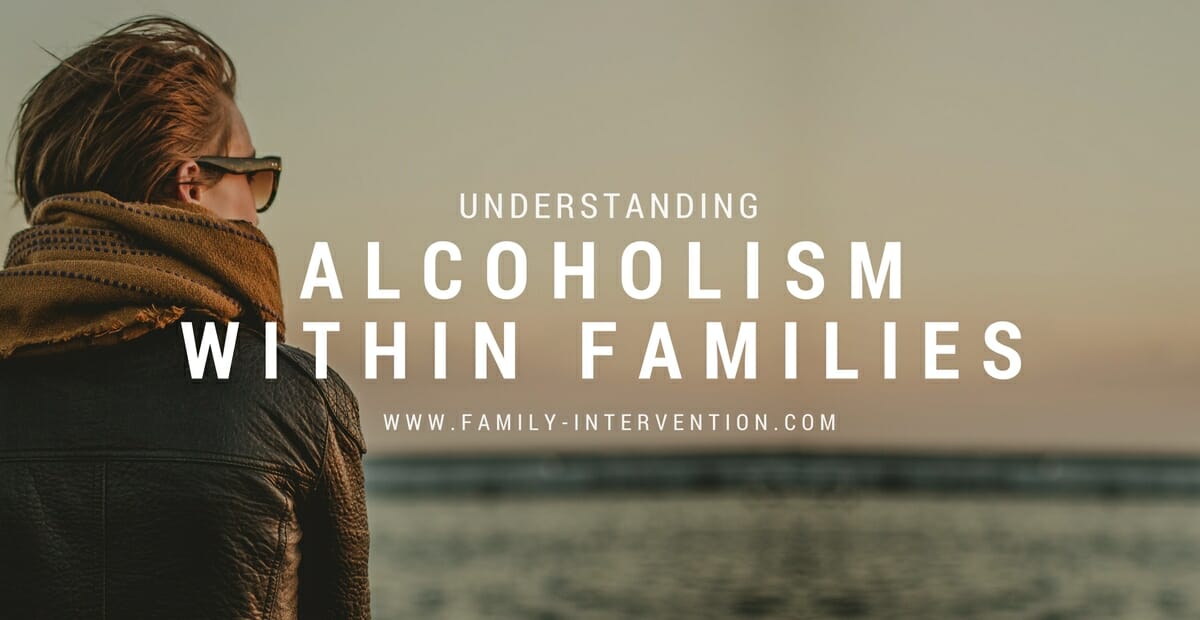Search by category, archive or keyword

As alcoholism gets more and more attention from mental and public health professionals, the link between alcohol and family relationships also has begun to stand out and become an accepted scientific fact. Researchers and medical care providers have recognized for some time that alcoholism can run in families.
In this blog, we’ll break down how alcohol abuse affects families and look at the following:
- Alcoholism and family relationships
- Denial
- Children of alcoholics
- Alcoholism in marriage
- Pregnancy and alcoholism
How Alcohol Abuse Affects Families
Family conditions and relationships have a tendency to enable alcoholics, and an alcoholic’s addictive behavior takes a serious toll on the entire family. In order to successfully treat alcoholism and prevent relapse, as well as prevent the disease from affecting other family members down the road, it’s important to understand the role that alcoholism plays within the family dynamic.
Alcoholism and Family Relationships
Alcoholism has often seemed a trait of dysfunctional families. Having an alcoholic family member disrupts the normal, healthy family dynamic, creating a host of problems that lead to dysfunction.
The spouse or partner of an alcoholic often doubts him- or herself, wondering what he or she contributes to the problem (the answer here, of course, is “Nothing”). Alcoholism is a disease, not anyone’s fault. Sometimes the spouse of an alcoholic falls into the role of an enabler in his or her attempts to keep harmony in the family or protect children from the influence of the alcoholic.
Likewise, children of an alcoholic parent can fall into a variety of different roles, none of which is healthy. The eldest child may take on the role of the family hero, taking responsibility for protecting younger siblings at his or her own expense. A younger child may fall into the role of the rebellious, troubled family scapegoat, a dreamy and withdrawn “lost child,” or the family clown who masks his or her pain with entertaining antics.
None of these family dynamics is healthy. They enable the alcoholic and prevent the other family members from living fully realized lives. This is why it’s important for families to address alcoholism together rather than letting the alcoholic suffer in isolation.
Denial
Denial also plays a role in alcoholism’s effect on families. Whether the alcoholic is in denial about the fact that he or she has a problem that requires help or family members are in denial about the alcoholic’s condition and its impact (such as an enabler), denial is just as damaging to the family dynamic as alcoholism itself.
Denial among family members leads to treating alcoholism as a shameful secret they must cover up. It prevents everyone in the family from getting help and exacerbates the problems caused by alcoholism itself. Family therapy can help family members move past denial to begin addressing the issues that prevent them from functioning as a normal, healthy family unit.
Children of Alcoholics
A parent’s alcoholism can have a profound and lasting effect on children. The National Council on Alcoholism and Drug Dependence estimates that there are 18 million alcoholics in the U.S., and roughly 26.8 million children are being exposed to the effects of alcoholism. The children of alcoholics are at a higher risk of developing alcoholism as adults – or even earlier. They’re also more likely to marry an alcoholic or abusive partner.
Alcoholism’s effects on children start at a young age. Even though they may not display a tendency toward alcoholism itself until they reach adulthood, the children of alcoholics tend to show outward signs of its impact much earlier. They are at an increased risk of developing depression and anxiety disorders, demonstrating antisocial behavior, engaging in problematic relationships, and struggling with behavioral problems.

Children of alcoholics also have a tendency to score lower on tests of academic ability than their peers, leading to problems with further school and job opportunities down the road.
Alcoholism creates a family environment that’s incredibly unhealthy for developing children. Children of alcoholics tend to experience a great deal of uncertainty and instability in their family life and are at an increased risk of either witnessing domestic violence or sexual abuse or experiencing it themselves.
It’s important for children to understand that a parent’s alcoholism is not their fault. Children will easily blame themselves for things that go wrong, believing that their actions and feelings are omnipotent. A child may come to believe that a parent drinks because of the child’s bad grades or innocent mistakes. Children often need the help of a professional counselor to realize that they are not to blame for a parent’s alcoholism.
Alcoholism in Marriage
Alcoholism can have dramatic and destructive effects on a marriage. One partner’s alcoholism can lead to a co-dependent relationship in which the non-alcoholic partner becomes as addicted to taking care of the alcoholic as the alcoholic is addicted to drinking. This leads the non-alcoholic partner to become an enabler, in denial that there’s a problem in the marriage, and allowing his or her own mental and emotional health to suffer at the cost of keeping the alcoholic spouse happy.
The spouses of alcoholics also are at a much greater risk of suffering domestic violence at the hands of their alcoholic partner. Like all abusers, alcoholics will often apologize and make excuses for violent actions, only to repeat the same behavior the next time they have too much to drink.
Alcoholism in marriage has a profound effect on the quality of a marriage. It leads to feelings of marital distress, feelings of anger that stem from unhealthy and dysfunctional communication within the marriage, resentment and stress resulting from the alcoholic’s neglect of familial responsibilities, and psychological distress and mental health problems for the non-alcoholic partner.
Pregnancy and Alcoholism
Alcoholism for a pregnant mother places her unborn child at significant risk. The American Academy of Pediatrics states explicitly there is no amount of alcohol consumption that is safe during pregnancy and that exposure to alcohol in utero is the top preventable cause of birth defects and disabilities.
One study of 6-year-olds who were exposed to alcohol during their mothers’ second trimester of pregnancy showed that they had lower academic achievement and increased problems with basic skills such as reading, spelling, and math.
Roughly 6% of children born to alcoholic mothers suffer from fetal alcohol syndrome (FAS), the most severe of a category of disorders known as fetal alcohol spectrum disorders (FASDs).

FASDs are entirely preventable if a woman abstains from drinking alcohol during pregnancy. A pregnant woman suffering from alcoholism, however, places her unborn child at significant risk if she does not seek help.
FASDs have lifelong effects on children in a variety of areas. Children with FASDs tend to be significantly below average height and/or weight for their age. They tend to display specific abnormalities in their facial appearances, such as a smooth philtrum (the groove between the upper lip and nose), a thin upper lip, and abnormally small eye openings. More significantly, FASDs have damaging effects on a child’s central nervous system and can lead to damage to the brain and skull structures, such as microcephaly.
Support for Families with Alcoholism
Alcoholism’s effects on families are serious and far-reaching. Fortunately, it’s easy to get support once you realize that you need it. Family members of alcoholics can educate themselves about the nature of addiction, recovery, and available treatments. If an alcoholic is in denial but friends and family agree that he or she needs help, they can work with a professional counselor to stage an intervention and encourage their loved one to seek treatment.
It’s important for family members of an alcoholic to show their love and support as they encourage their loved one to get help. Judgment and blame are not helpful or healthy. It’s also important for family members to cease any enabling behavior, which a counselor may also be able to help with.
Family members must be sure to look after their own well-being during the time of recovery, including recognizing ways they may need mental or emotional counseling themselves. Family therapy sessions can be a huge step toward healing, not just for the alcoholic but also for the entire family. Support groups such as Al-Anon and Adultchildren.org provide support and resources specifically for non-alcoholic family members of alcoholics.
Alcoholism – like heart disease or cancer – is a devastating illness. Unlike these other diseases, however, it still faces a significant amount of stigma in our society, which can prevent alcoholics and their families and loved ones from seeking needed help.
Alcoholism affects the entire family, and the entire family must be involved and invested in order for an alcoholic to make a full and successful recovery. Addressing the issue early, with love and understanding, can help stop alcoholism from irrevocably damaging family relationships.
Contact us today and have our specialist come to your home and help your loved one. You’re not alone. Help is available.
An intervention is not about how to control the substance user; it is about how to let go of believing you can.
“The most formidable challenge we professionals face is families not accepting our suggested solutions. Rather, they only hear us challenging theirs. Interventions are as much about families letting go of old ideas as they are about being open to new ones. Before a family can do something about the problem, they must stop allowing the problem to persist. These same thoughts and principles apply to your loved one in need of help.”
Mike Loverde, MHS, CIP



